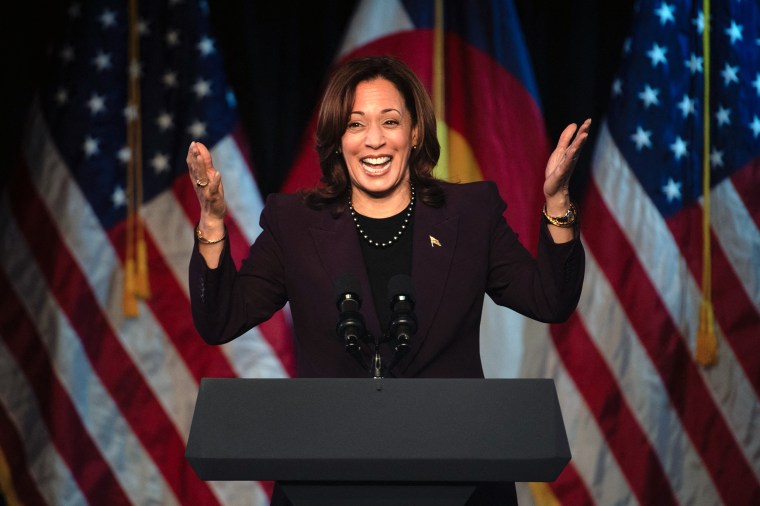Fresh from a swing through Western states, Vice President Kamala Harris told NBC News there are reasons for Latino voters to be optimistic about the economy and jobs, even if they are not feeling the upswing yet.
Harris’ trip to Arizona, Nevada and Colorado was intended to hammer home President Joe Biden’s State of the Union message with Latino voters and shore up their support.
The vice president, who met with Hispanic supporters last week and early this week, said that wages have outpaced inflation and that inflation is headed downward. She touted the creation of millions of jobs and low unemployment, including among Hispanics.
"The numbers tell us that the economy is stronger than it has been in a very long time ... it takes time for those accomplishments to be felt," she said in a phone interview Wednesday.
Harris touted Biden administration policies that she said have benefited Latino families, including a cap on prescription drugs on seniors and a cap on insulin prices, which has had a direct impact on Latinos, who are 70% more likely to be diagnosed with diabetes than non-Hispanic whites.
She noted that the administration's more than $1 billion student loan debt forgiveness has helped many first-generation students, including Latinos, and its investment in community banks has boosted lending to Latino small businesses.
Harris said "our challenge is we just need to let people know who brought it to them.”
But the campaign faces an uphill climb to reassure Latino voters that they are seeing better economic times. In recent years, many Latino and Black households have spent bigger shares of their household budgets on goods where inflation was highest, such as food and rent. That followed a couple of years of job and income losses when the Covid pandemic forced businesses to close.
An NBC News poll conducted in late January showed Biden’s approval rating at just 35% among Latino registered voters. Biden and former President Donald Trump were tied among Latino voters (Trump 42% and Biden 41%) who were asked whom they would vote for in a rematch.
In 2020, Biden won 65% of Latino votes, compared to 32% for Trump.
The economy and jobs were ranked as their top concerns in a December survey of more than 3,000 Latinos eligible to vote by UnidosUS, an advocacy group.
Arturo Vargas, executive director of the National Association of Latino Elected and Appointed Officials, said that the "economy is top of mind" in this election cycle, and that it's not just what polls are showing, "but what I'm seeing and I'm hearing and people are reacting to."
In 2024, about 22% of Latinos will be voting in their first presidential election. Almost a quarter (24%) of Latino voters between the ages of 18 and 29 voted for the first time in 2022, according to the Brookings Institution, a liberal think tank.
A 2024 UnidosUS survey of 1,500 Latino parents or caregivers of children ages 5 and under, reported that 30% said they were doing better than last year, a third said their situation was the same and 37% said they were doing worse. The survey had a 2.5% margin of error.
Harris said that "there's still more work to be done" in a second presidential term, naming homeownership and rent reduction, as well as lower child care and home health care costs, as priorities.
The current levels of migration at the border and its repercussions on U.S. cities have become top voter concerns in the 2024 election cycle and one of Trump's top point of attacks against Biden.
Harris said that immigration is one issue on the November ballot where the choice between candidates is "binary."
Trump has said immigrants poison the blood of America, he has "killed" the bipartisan border bill and has said that he would carry out a mass deportation operation, she said.
In contrast, Harris said, soon after Biden's inauguration, he proposed a bill that included a pathway to citizenship for eligible immigrants that Republicans would not take up.
"The reality is they would prefer to run on the problem, which is a broken immigration system, instead of fixing it," she said. "We have people who have 10, 20 years living a very productive life, paying taxes, contributing to the economy who have no pathway to citizenship because the pathway is so broken."
A recent Pew Research survey found that about three-quarters of Hispanics view the growing migration across the U.S.-Mexico border as a major problem or crisis and roughly the same share believe the federal government is doing a bad job of handling it.
Latinos, however, are less likely than other Americans to see more deportations and more border wall as effective responses, according to the survey.
Speaking to NBC News a day before visiting an abortion clinic in Minnesota — a first for a president or vice president, Harris said reproductive rights is an issue on which she believes she and Biden have a majority of Latino voter support, citing that 40% of Latinas live in a state with an abortion ban.
A Pew Research survey found that a majority of Latinos (57%) say abortion should be legal in at least some cases, including 69% of Democrats or those leaning Democrat and 39% of Hispanic Republicans or those leaning Republican.

